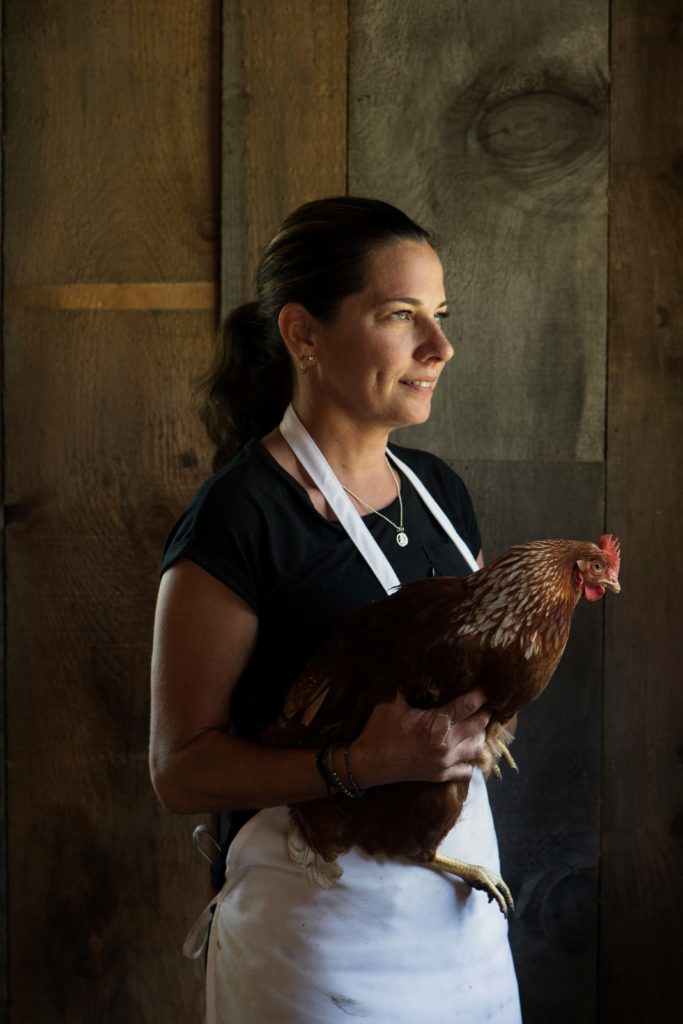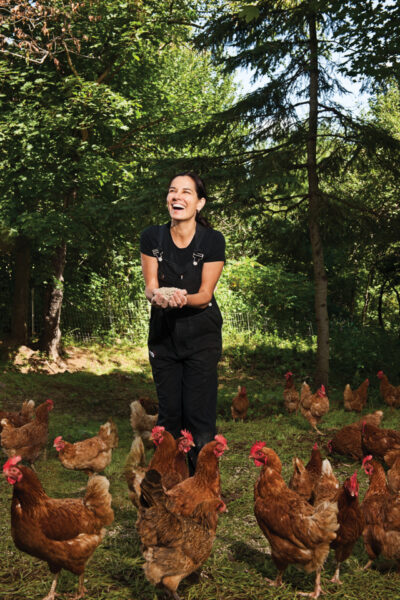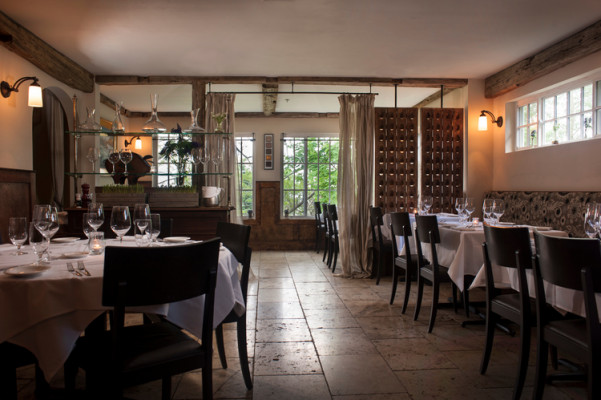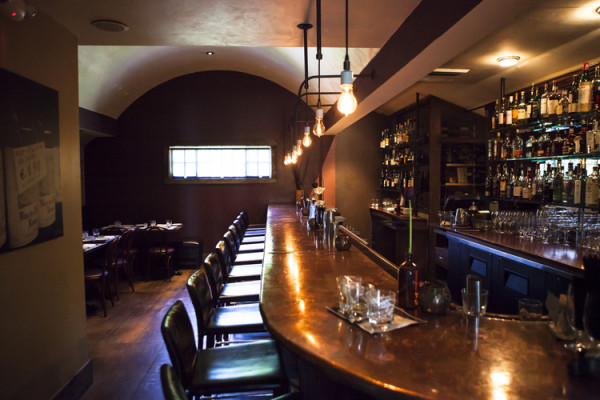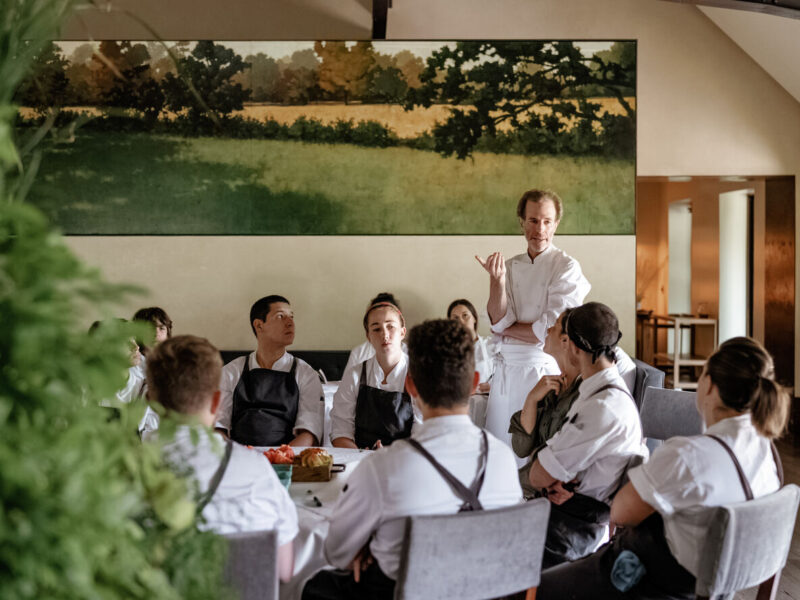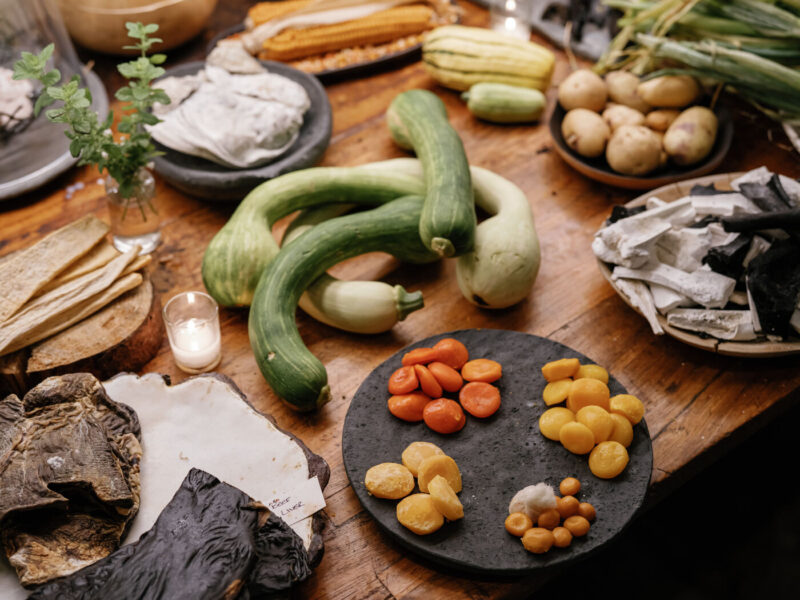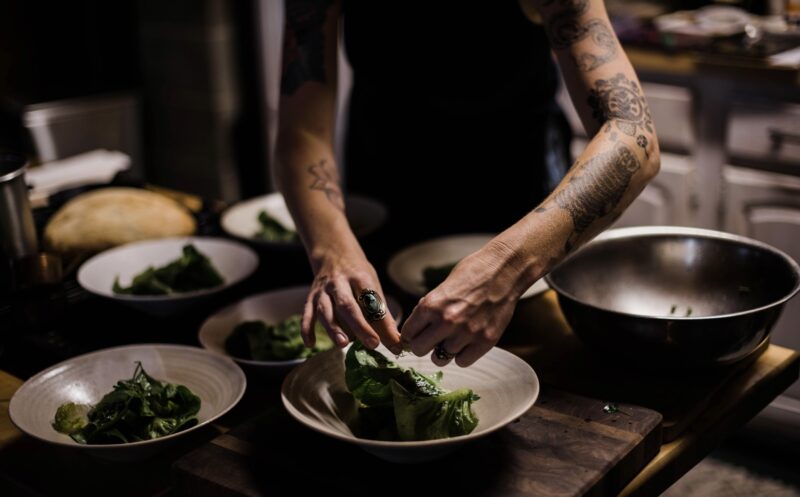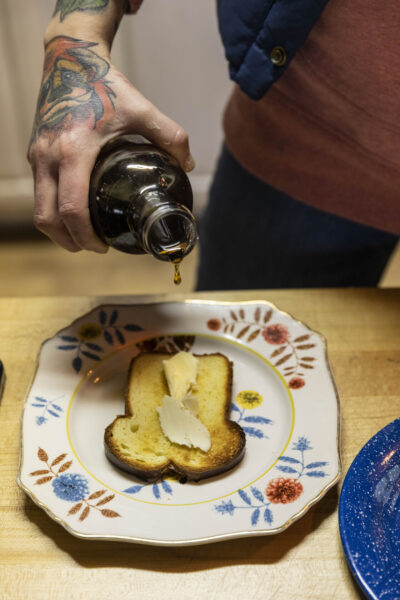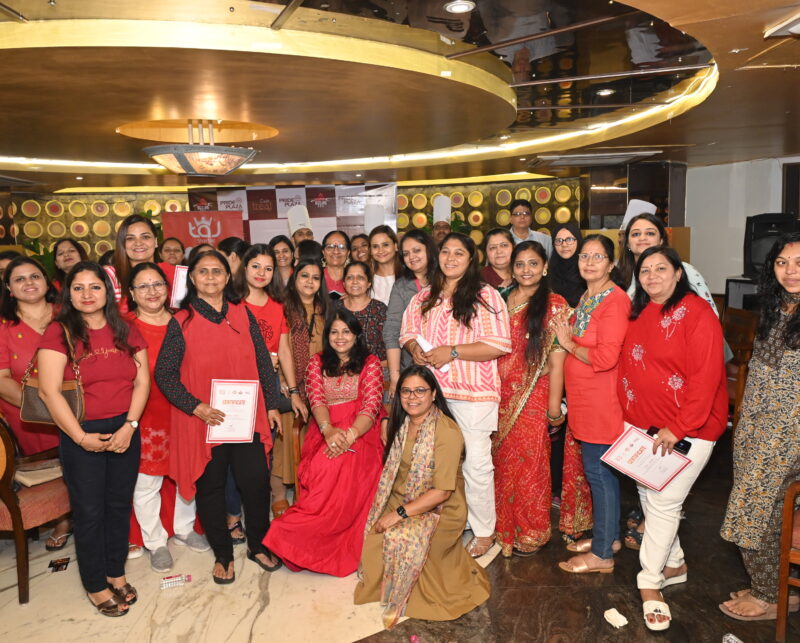RESPECT THE INGREDIENTS
Editorial Team
With sustainability being the focal point of discussion among culinarian, three celebrated chefs from the USA tell us about the importance of the ingredients and how they are farmed or foraged.
CHEF DAN BARBER,
Chef Dan Barber is co-owner of Blue Hill Manhattan and Blue Hill at Stone Barns. For Dan, David and Laureen Barber, Blue Hill is the name both for their two restaurants, and for the farm that inspired them. Blue Hill New York opened in Manhattan’s Greenwich Village neighborhood in 2000.The restaurant has evolved over the last two decades, sourcing ingredients from Blue Hill Farm, the Barber family’s dairy in Great Barrington, MA; from the Stone Barns Center for Agriculture in Pocantico Hills, NY; as well as from farms within 250 miles of New York City. Blue Hill at Stone Barns opened in 2004 and seats 88 people in what was a cow barn. In 2016, Eater rated Blue Hill at Stone Barns as the best restaurant in the United States. In 2019, the Michelin Guide expanded to include Westchester County, and gave the restaurant two Michelin Stars. It is the only restaurant in the county to receive any Michelin Stars.
Says Barber, “Years ago, I was standing in a field in upstate New York at Lakeview Farms, a farm operated by Klaas and Mary-Howell Martens, because I had decided I wanted local flour for my restaurants. That day, Klaas taught me a life- changing lesson: the secret to great-tasting wheat isn’t the wheat itself but rather a whole rotation of crops that enrich the soil. Here I was cherry-picking Klaas’s wheat for my menu rather than supporting the whole farm—it’s tantamount to treating his farm like a grocery store aisle. We need to look beyond it, to a nose-to- tail ethic of eating the whole farm product. I’d been cooking with the ‘farm–to- table’ ideal for 20 years before I met Klaas. The idea that farm-to-table does not go far enough was a late-inning revelation for me—the truth is that farm to table has not, in any fundamental way, altered the economic or political forces that dictate how our food is grown. Big farms have only gotten bigger over the last two decades. Reworking how we support the right kind of farming has to take on a new urgency.
In your traditional, Western, 3-course dinner, the entrée canters a big steak, accompanied by a smattering of vegetables and potatoes. We flip this conception on its head, making a vegetable or grain the focus of attention and meat the supporting actor—a dish that reflects the true carrying capacity of the land. Right now we’re serving a parsnip steak—a very large, intensely flavorful root vegetable that was in the ground for 12 months, then hung for two weeks like we dry-age beef. So it becomes a steak dinner, carved tableside.
Chef Dan Barber who has received several James Beard Foundation awards, including the 2006 award for Best Chef: New York City and the 2009 award for Outstanding Chef in the year when the Foundation also named him the top chefin America, speaks passionately about how ecological and sustainable farm systems affect the flavor of agricultural products. Explains Barber, “Over and over again, I’ve found that if you are pursuing delicious ingredients, you are by nature also pursuing good farming—they are one in the same. Growing up, I spent my summers haying the fields at Blue Hill Farm, my grandmother’s farm in the Berkshires, and I think my experiences there gave me a sense of responsibility about the land, and an understanding of the spaces we should be preserving. But at the end of the day, I am a chef driven by flavour. Ingredients that have been grown with great ecology offer a fantastic flavour and narrative that are better than any seasoning I could provide”
In 2009, Jack Algiere, Stone Barns Center’s farm director, invited a group of plant breeders from Cornell University to have Chef Dan Barber cook for them at Blue Hill at Stone Barns in Pocantico Hills, New York. After the meal, Barber took breeder and Cornell University associate professor Michael Mazourek for a kitchen tour, and this led to the development of the Honeynut Squash, a cultivar of a cross first developed by Cornell University plant breeder Richard W. Robinson. The Honeynut Squash changed the idea that plant breeding is done to increase yield, this tiny vegetable proved that breeding can be done for better flavours as well. “Seeds are the blueprint for flavor and nutrition. And the blueprint needs to be specific to place—that’s the very definition of regenerative—because seeds respond to particular climates and soil conditions, and we need to select for these environments. You can have the best farmer or soil in the world but if the genetics aren’t there they can never be expressed. In that sense, once the seed is in the farmer’s hands, the cake has been mostly baked. We launched Row 7 Seed Company, to support regional breeding, outside of large multinational seed companies owned by large chemical companies,” Barber states. In 2014, he published The Third Plate: Field Notes On the Future of Food in which he describes the development of mankind via food in four episodes: “Soil”, “Land”, “Sea” and “Seeds”.
Barber believes flavour has to start with an understanding of soil and that people in countries like America need to change the way they farm and eat. He has spread his message through TED talks and media. He was on President Obama’s council for health and nutrition and in 2009 Time magazine named him one of the world’s 100 most influential thinkers. Talking about sustainable agriculture and food, he states, “ A 2021 study from Iowa State University found that adding a third crop like barley to a corn-soybean rotation can cut greenhouse gas emissions by 54%, a fourth crop like rye in the rotation lowers emissions by another 10%. If we want more farmers to invest in ecology by incorporating soil- supporting rotational grains, we need widespread culinary applications, and excitement from diners about the flavor of those grains. We can see this across cultures. In many Indian cuisines, grains like millet have a substantial market because of the prominence of foods like ragi dosa, but these grains are very rarely seen in American bakeries. Last summer, we started working on creating gluten- free flatbreads inspired by the fermented doughs and batters of roti and dosa using rotational grains like sorghum and buckwheat. The results were delicious, and that’s the way to introduce the necessity of grain diversity into food culture. These crops need to become celebrated in the U.S. so that rotations become not just environmentally necessary, but in demand by the people who are eating them”.
About the future he says, “Looking ahead, grains—and what they can do for soil, and for our environment—are on my mind”.
CHEF MELISSA KELLY, PRIMO
Winner of the 1999 and 2013 Best Chef in the Northeast in a James Beard Award, Melisa Kelly is the co-founder and executive chef of Primo restaurant where she specialises in Italian cuisine and Mediterranean cuisine with a focus on local ingredients. Chef Kelly currently owns and operates PRIMO Restaurants in Rockland, ME and the Ritz Carlton Marriott Resort Grand Lakes in Orlando, FL. She re-opened her Orlando location in the fall of 2021 after an extensive renovation completely reimagining the property and tracing Chef Kelly’s family roots back to
Puglia, Italy. She remembers her childhood cooking lessons with her Italian grandmother. “The experience was clean as you go!! I learned to make pasta at the age of five. Family recipes and a few family secrets!’’ she enthuses, “I was mesmerized by the first professional kitchen I worked in. I was a server, but I knew I should be in the
kitchen. Plus my upbringing was all about food and meals together”. Thus, Melissa attended the Culinary Institute of America, Hyde Park, NY and graduated first in her class. Her post-graduate education took place in some of the top restaurant kitchens in the country. “ Working for Larry Forgione, Harmut Handke, Rich D’orazi, and Alice Waters…my first chefs position, opening my own restaurant, winning a James Beard award, winning the same award again! All these are highlights of my career”, she smiles.
In 2002, Melissa and her husband, pastry chef Price Kushner, completely refurbished an 1890 Victorian home. Named Primo after her Italian grandfather, Kelly made this restaurant her model of responsible growing which introduced East Coast diners to the idea of farm-to-table with its use of local products and the restaurant’s own gardens, greenhouses, chicken coops, bees, and livestock. What led her to take the plunge of a farm-to-table restaurant with up to 80% of the produce in some reasons coming from their own land? “ I worked on a sheep dairy farm…Old Chatham Sheepherding Company. I learned a lot, but prior to that working for Larry and Alice both pioneers of the farm-to-table movement also inspired me. The farm provides honey, fruits, veggies, eggs, edible flowers, micro- greens, fresh chicken, and house-cured and smoked meats. Nothing is wasted; everything has its place”.
She says she chose Maine for her venture because it was affordable, up and coming, and has some great produce. “Maine has a plethora of wild and local ingredients. The seafood, the farms all of it, has some great produce. Lobster, crab, sunchokes, mushrooms, local herbs and flowers, so many things are so good here. Maine heirloom grains, fruit in season…peaches, rhubarb, blueberries…Fiddlehead ferns”, she says
About their top dishes, she says, “I feel like when you eat local and fresh…seasonal to the moment you are getting the most nutritious foods, they haven’t been stored or travelled across the country depleting their vitamins and
nutrients by the minute, day, week. We have farm fresh eggs and we raise our chickens and pigs – so we know how they were cared for and what they ate. I feel this is healthy. We harvest honey and it is raw, and that is great for your immune system. We make fresh tinctures and herbal infusions as well as fermented andpickled foods…this is all healthy. Clean, pure, organic ingredients’’. She says the Pork Saltimbocca, the Farmer Salad, the Cannoli, Budino and Affogato are among their signature dishes. “Besides these, I have seasonal
favourites that come back year after year. But there is always new dishes, new ingredients, new inspiration, all depends on my travels, my team and mother nature”, she explains, adding, “I just purchased 5 acres adjacent to Primo, so we will be expanding our farm and hoping to maximize what we do and become more sustainable with everything we do. Hope to look into solar energy and reduce our carbon footprint more and more each day”.
CHEF ILIANA REGAN
A Michelin-starred chef and restaurateur, Chef Iliana Regan moved to the Hiawatha National Forest where she founded the The Milkweed Inn. She says she was born on a small farm to parents who at one time or another were restaurateurs and chefs.
“I have a long line of chefs and culinary folk in my family. Everything on our farm was seasonal and my parents were always preserving, homesteading, seed saving, and cooking from scratch, she says, “So the culinary profession is in my blood. I grew up foraging and having unconventional foods in my meals. My fondest memories are of cooking wild mushrooms with my mother and father, ones that we foraged ourselves. It became natural for me to use them in my meals and things I cooked for others. I would say the hardest part of it has been, once I had my own full-time restaurant was finding the time to procure them myself”.
In 2008, Regan began selling microgreens and vegetables at farmer’s markets, and making filled dumplings called Pierogi for the markets. In 2010, she started a weekly supper club hosting 10-12 diners in her Chicago apartment.
Regan named her restaurant Elizabeth for her deceased sister. This restaurant in Chicago largely used home-grown and foraged ingredients. She received one Michelin star for each year she owned and operated Elizabeth Restaurant. She says, “The highlights of my culinary career have of course been Michelin, James Beard nominations, Food and Wine Best New Chef. But, I also enjoy the interpersonal relationships. I’ve learned so much from managing a staff. I have made friends along the way. I’ve learned from others in ways I could have never imagined”. In July 2020 she passed on Elizabeth to her employees.
“I left the Michelin star restaurant world because I wanted to still be a part of my career, cook and do what I love, but be able to get back into the woods and the garden. The only way I knew how to do that was by not running a full-time restaurant. I want to be more conscious about how I’m collecting all the things I use and honouring the environment and natural resources. Cooking for less people, 10-12 guests a week is much more up my alley”, she says.
Running a place in the forest has its own challenges. Regan elaborates,” I wouldn’t have ever guessed that once a year I need to get roads graded to make us accessible or that I have to set up precautions for wild animals, things like that. We are so off the grid. Think of just anything you might take for granted like having a oven. I do not have an oven so the open fire has been my main cooking source. Everything about being at Milkweed in one way or another has been a challenge but it’s been a good one. It’s put my problem-solving brain to work in a much different way than when I was in the restaurant”.
While Milkweed’s specialties are her pierogi (In 2008 Chicago Magazine named Regan’s pierogi the best in the city) and mushroom tea, the most exciting part of her menu is the ingredients. “We definitely have top ingredients like wild mushrooms, wild greens, wild berries, Lake Superior trout, fresh whitefish, whitefish roe, whitefish livers, so many things close to the area and special to the area that can’t be found anywhere else because a wild blueberry from here is so different from a cultivated one somewhere else. It’s all about time and place. A grain in our region that I’ve fallen in love with is the wild rice.”
Talking about sustainability, she believes, “I think anything found or foraged is special and must be harvested properly. If we are foraging one needs to be conscious of what else around this or that plant needs it for it to sustain the environment. It’s important to treat it with care and thought. I’m not sure anything needs to be promoted but it is good for people to get out and learn about these things and become stewards in their own way”.


